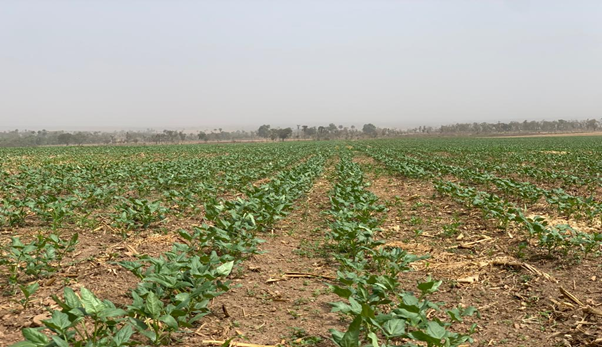
[ABUJA: Feb. 8, 2023] The African Agricultural Technology Foundation (AATF) has identified suitable planting windows for cowpea (beans) for different regions in Nigeria.
This will help farmers cope with erratic weather patterns, said Dr Jean Baptiste, AATF Regional Representative for West Africa, during a visit to Pandagric Farms in Nasarawa State.
“After a careful study of the situation, we have come to understand that because farmers are not guided on when to plant, beans production is often interrupted by climate uncertainties. The rainfall pattern is not uniform and each year comes with its own surprises, so it is important for farmers to be accurately guided,” he said. Such uncertainties, he said, had greatly reduced cowpea production.
“It is either that the rain is too much, submerging cowpea farms all over the places as a result of flash floods or the rains end suddenly, and drought sets in at a time that the crop needed enough water.”
Dr Baptiste said farmers in the Sahel region comprising Borno, Yobe, Jigawa, parts of Katsina and Sokoto states should plant in the third and fourth week of June in time for early rains.
Those in the Sudan Savannah region including Kebbi, parts of Sokoto, Zamfara, Katsina, Kano, Jigawa, Bauchi, Yobe and Borno states should plant in the first two weeks of July. The best time for farmers in the Northern Guinea Savannah states of Bauchi, Kaduna, parts of Katsina, Kano and Zamfara is between the third week of July to first week of August.
Those in Southern Guinea Savannah states of Niger, Kwara, parts of Abuja, Adamawa, Taraba and Gombe should plant in the first to third week of August. Cowpea farming was boosted two years ago with the commercialization of the Pod Borer Resistant Cowpea which has enabled farmers to have two seasons.
Statistics from the Institute for Agricultural Research, Ahmadu Bello University Zaria show PBR Cowpea is the most sought-after variety in the country. The variety is preferred by farmers due to its early maturing quality, use of less chemical spray, high yielding, and high folder production.
Founded in 2003 to address Africa’s food security prospects through agricultural technology, AATF believes that the agricultural sector is a key foundational pillar as Africa consolidates its economic growth and carves out its new position as a major global economic powerhouse and the next growth market in the world.
It was formed in response to the need for an effective mechanism that would facilitate and support negotiation for technology access and delivery and formation of appropriate partnerships to manage the development and deployment of innovative technologies for use by smallholder farmers in Sub-Saharan Africa


















































































